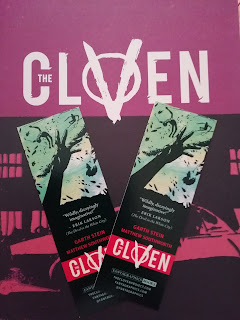The Cloven
Book One written by Garth Stein Drawn by Matthew Southworth is a graphic novel absolutely interesting and touched me profoundly. There is a sophisticated and obscure, at the same time, atmosphere; you won't find sun, light or illustrations set in a sunny day, no: the story remarks the sufferences of clovens, so the various sets, for a reason or another are in the obscurity; an obscurity where creatures re-born, re-discover freedom or simply... Are born for then being imprisoned and treated for experiments; clovens grow up in the sufferance because their existence is planned for horrible purposes; they live in cages, in captivity, substantially; horrible scientists plan the destiny of these humans-goats: I loved the stunning, very strong colors of the illustrator that will underline the story, and the main character looklikes a manga.
The story starts pretty sadly: in a laboratory a baby is born: but this baby is the fruit of an experiment: he is half human and half...goat. The Cloven is apparently normal and human like us, if you look at him, but there are many differences.
What scared me to death were the evil doctors and people who manipulated them from the beginning to the end in the most heartless way.They consider these humans manipulated in a laboratory simple instruments for reaching their golas, for only later understand that they have feelings, they are social and they should grow up in a family, surrounded by love.
A cloven don't know what means freedom, but he learns the messages of the outside world once set free pretty rapidly, exactly as a goat would do; with efficiency for his own existence.
Grown by heartless people, only interested in experimenting on them this and that, once the first one will be set free will discover at first a lot of squalor around him, not too much different from the world left behind, finding some peace only in a homeless spot of the city.
Another thematic treated in the graphic novel is also the heavy condition of homeless in the city of Seattle but also how diversity, so being a cloven in this case, can be an opportunity.
Why these people continued to create all these clovens and what kind of destiny do they have?
It wouldn't be a great destiny, most of them wouldn't live enough, plus their creation hasn't been done for the purposes officially known...So, once, someone decides of setting them free.
Although these creatures are skepticals when they meet new friends, the message that the writer spreads is this one: you must be here, with us, this one is the best place for you.
Beautiful, tender, human work, highly recommended.
I thank Garth Stein for the physical copy of this graphic novel.
Anna Maria Polidori















